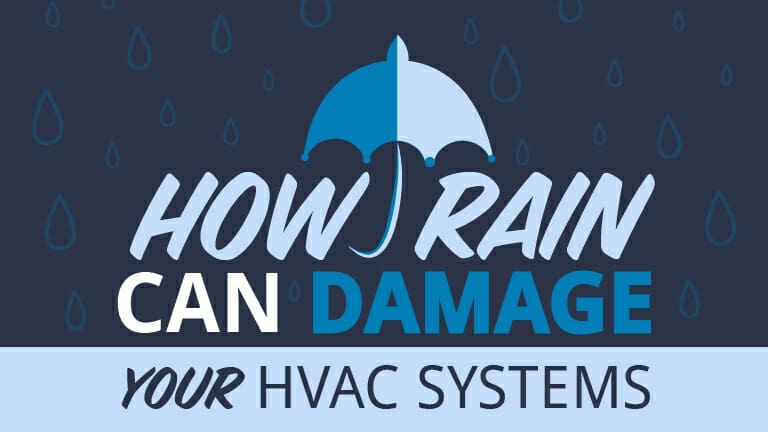
How Rain Can Damage Your HVAC Systems
Water and electronics don’t mix. They tend to end with zaps, shorting out, or other unfavorable circumstances. Which begs the question: can rain damage your HVAC systems and how does your AC survive when half of it is exposed to the elements?
Well, for the most part, the outdoor components of traditional forced-air HVAC systems are built to withstand the elements. Manufacturers know that half the system is going to be outdoors, so they construct them to be able to withstand most of what could come their way.
The outdoor part of your unit houses the compressor and condenser, which is why it’s built with corrosion-proof metals, and the internal wiring and connections are all sealed to protect them from any rain, snow, or dust that might find its way in. The inside part of your unit is where the evaporator coil is housed, which is the only aspect of your AC that could be susceptible to non-impact related weather damage. These higher durability standards help your unit to withstand heavy rains and high winds to ensure that regular storms will have no effect on your unit’s efficiency or ability.
Will Rain Cause Damage to My AC?
Rain is only a cause for concern if your home has a tendency to flood during storms. As HVAC units aren’t built to be fully submerged in water, this could cause a short in the electrical circuits, or damage to the wiring, fan motor, or other parts of the unit. Rain could also cause rise for concern due to the high winds, lightning, and hail that might come along with it, which could damage the unit by either blowing debris into the exposed part of the unit or directly striking it. Power outages could also pose a slight risk, as a power surge could damage the outdoor compressor or control circuits when the grid comes back on.
How You Can Protect Your AC
- Regular Maintenance:
Keeping your system running smoothly starts with keeping your system properly serviced. If something small is off in your unit, a storm could be the straw that breaks the camel’s back and causes an even bigger issue within your unit. Make sure your system is ready for all kinds of weather by scheduling regular maintenance check-ups for your unit. This is the easiest way to keep your mind at ease, as your technician will be sure to point out any possible dangers your unit could be in or cause.
- Keep it Elevated:
You can also opt to keep your unit elevated, as this could help reduce the risk of flooding ruining your unit if you are in an area that is prone to flooding. Just be sure to anchor it (a concrete base will help to keep it weighted and be resistant to water damage) so strong water currents don’t push it around. Your HVAC technician can suggest a base height that’s best suited for your area, unit, and home.
- Hail Guards:
Heavy rain can sometimes be accompanied by heavy winds. The rain itself won’t hurt your AC, but the winds might cause something nearby to strike your unit. Those kinds of impact damages can cause serious damage to outside part of your unit. This is where hail guards come in handy. They’re made of a thick metal mesh, so they won’t budge during the storm, but they will still allow for sufficient ventilation in your system; and since they have easy to use hinges, your HVAC tech will still be able to perform regular maintenance on your unit.
- Clean Up:
To further minimize the chances that Mother Nature will hurl something into your unit during your next high-wind storm, you should also keep your lawn and area surrounding your home clear of anything that could be picked up by such winds. This might mean trimming nearby tree branches that look like they might come down, making sure your gnomes are hiding in your shed before the storm, or putting your lawn chairs in the garage at the end of the day.
- Turn it Off:
Storms can also mean power outages. If you’re expecting a huge storm, cutting power to your system on your circuit breaker can lower the chances that your unit will be damaged from a power surge or damaged transformer when the power comes back on. The fluctuation in power as it levels out after initially coming back on can really damage electronics, so you’ll want to make sure they’re all off, and stay off, for at least 5 to 10 minutes after the power comes back. Investing in surge protectors can also minimize the risk of power surges messing up your electronics as well.
Although most regular rain won’t damage your AC, extreme weather conditions can certainly cause damage. These simple tips can help to keep your system safe, your home prepared, and you feeling confident that your unit is protected. If you’re skeptical about how well your system will hold up in the rain, it’s always a safe bet to call your HVAC tech to check it out and give you a professional opinion on what you should do.
If you think your unit has been damaged during a storm and poses an immediate danger to your or your family’s safety, you can call our 24/7 Emergency Service at 866-210-7258
